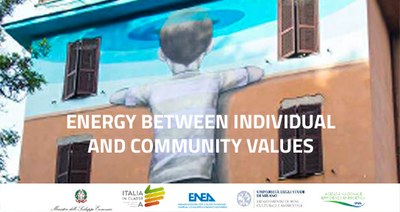Energy efficiency: University of Milan-ENEA study on individual and community behaviors
21/1/2021
 Online the report "Energy between individual and community values" which analyzes environmental behaviors and energy consumption of families from an environmental psychology and social sciences perspective.
Online the report "Energy between individual and community values" which analyzes environmental behaviors and energy consumption of families from an environmental psychology and social sciences perspective.
This is the second stage of a collaboration between the Milan State University (Chair of Social Psychology) and the ENEA Energy Efficiency Department Unit - which also wrote the preface - as part of the national campaign on energy efficiency "Italia in Classe A ”, promoted by the Ministry of Economic Development and implemented by ENEA.
The analysis was conducted on a sample of Lombardy residents whose actions taken in the last five years to curb their energy bills were examined. In particular, the study shows how different energy subcultures can often coexist within a single family, due to variables like gender, age, type of dwelling and commitment to sustainability issues.
"With this publication, ENEA wants to make available a multidisciplinary tool for cutting consumption and promoting an energy efficiency culture in which, in addition to technologies, behavioral changes have a crucial role.
That’s why the Communication Tools for Energy Efficiency Lab in our Department is also conducting transversal research on behavioral change in energy transition ", Ilaria Bertini, director of the ENEA Energy Efficiency Unit Department pointed out.
As for gender differences, also in Italy virtuous energy behaviors are more widespread among women than men, as the former have a greater awareness of the effectiveness and positive impact of individual actions. This translates into concrete daily practices, while skepticism prevails in males on how behaviors actually impact society as a whole.
The study found different approaches to sustainability also within age groups. The 18-37 group pursues sustainable ethic, is open to change also regarding mobility and shared services, while the over 78s group, tendS to save water and electricity consumption for economic reasons.
The report also shows that “energy-saving” families, i.e. adopting environmentally friendly behaviors, acquire a lower number of appliances and household appliances (-16.3%, with equivalent family size).
Also the behaviors of those who live inside condominiums differ greatly from those who live in independent houses.
The study shows how condominiums have a lower presence of household appliances and adopt a more innovation-oriented consumption, due to their smaller size, the possibility of sharing heating systems and their geographical distribution , as they are much more common in large urban centers.
The biggest differences concern actions to curb energy consumption, implemented mostly in condominiums, where over 59% of the interviewees said they had carried out at least one intervention in the last five years, compared to 21% of those living in independent dwellings.
On the contrary, the percentage of interventions stimulated by economic incentives is higher for those who live in independent dwellings (40%) than for those who live in condominiums (32%).
"The report shows the importance, in terms of effectiveness, of the ability to give users real time feedback on their correct behavior, in order to design awareness-raising strategies addressed to citizens, implemented through timely methodologies in the different uses of renewable sources ”, Bertini concluded.
The unabridged report (in italian) is available at: L'energia tra i valori individuali e comunitari
